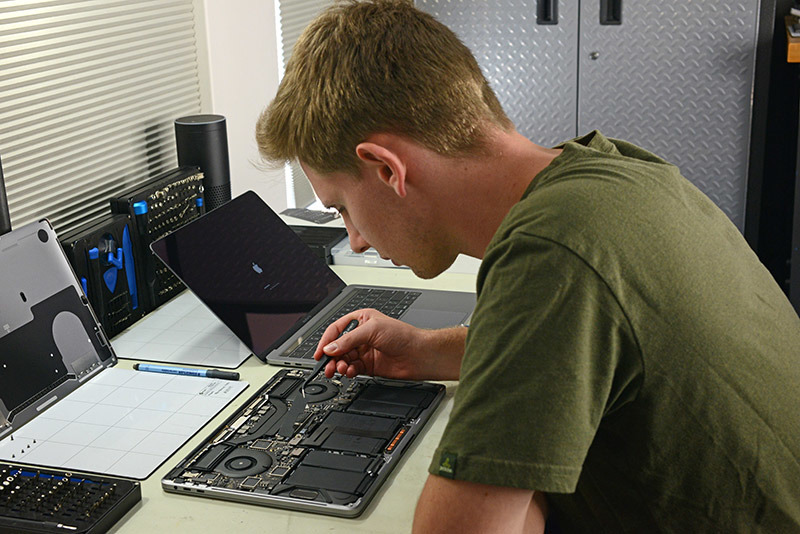In the wake of revelations that Apple plans to employ a special diagnostics tool that effectively blocks certain third-party MacBook Pro and iMac Pro repairs, DIY specialist iFixit evaluated the issue to find the new policy is not yet active.
On Thursday, leaked Apple support network documents outlined a new process Authorized Service Providers must follow when repairing Macs containing the T2 security chip, currently limited to the 2018 MacBook Pro and iMac Pro.
Specifically, Apple said repair personnel must run proprietary system configuration software, "Apple Service Toolkit 2," after replacing the display assembly, top case, logic board or Touch ID board of a MacBook Pro and the logic board or flash storage on an iMac Pro. Failure to run the software suite renders the host system inoperable, Apple says.
According to iFixit, however, the repair policy is not yet in effect. In evaluating Apple's claims, the DIY firm purchased a new 13-inch MacBook Pro with Touch Bar and proceeded to swap displays with an identical MacBook Pro model subjected to its annual teardown in July. iFixit also updated the older machine to macOS Mojave and traded logic boards.
In each scenario, both MacBook Pro models functioned normally following the repairs.
"Our guess is that this software tracks serial numbers and other parts data so Apple can verify AASPs are correctly completing repairs," iFixit said in a blog post. "It may also perform calibration, or it could simply be a way of keeping their authorized network in line. Basically it means Apple owns your device, not you, and could conceivably disable it remotely if they detect unauthorized repairs going on."
The firm goes on to say the AST 2 procedure might be a system for tracing parts used in Apple's authorized repair network. Alternatively, it could be a method by which Apple can monitor the quality of repairs or track replacement rates.
"It's possible that units with swapped parts may operate normally, but still report a failure in Apple diagnostic tests for having unauthorized' components installed— much like earlier units did on earlier versions of AST for third party HDD/SSD, RAM and batteries," iFixit said.
The new policy was widely reported after its disclosure Thursday, with some voicing concern that AST 2 played into so-called "planned obsolescence" strategies. Depending on how the system rolls out, Apple can, for example, discontinue repair support eligibility for T2-equipped machines when they reach end-of-life, forcing customers to buy a new machine.
Others, including iFixit, ponder how Apple's strategy impacts — or might be impacted by — "right to repair" legislation being readied in a number of U.S. states. The laws seek to force tech companies like Apple to provide consumers and third-party repair outlets access to repair information, diagnostic equipment and parts.
 Mikey Campbell
Mikey Campbell







-m.jpg)






 Charles Martin
Charles Martin
 Christine McKee
Christine McKee
 Wesley Hilliard
Wesley Hilliard
 Malcolm Owen
Malcolm Owen
 Andrew Orr
Andrew Orr
 William Gallagher
William Gallagher
 Sponsored Content
Sponsored Content







27 Comments
https://ifixit.org/right
"Apple owns your machine, not you" is a bit rich, coming from -- oh look! -- a repair-tool supplier that encourages non-certified amateurs to do their own repairs.
Again: how dare Apple move to limit repairs to trained and authorized repair outlets! LOL
This doesn't mean you HAVE to take it to an Apple Retail store to get repaired. There are still 3rd party Apple Certified Service Centers you can take it to as well. You just can't take it to Bob's Computers and have your 2018 MacBook Pro repaired...which I don't know why in the hell you'd do that anyways. They cannot get genuine Apple parts, or just Apple parts in general so its little or no benefit to you anyways.
$600 to repair an apple proprietary keyboard? Anybody that defends this is nuts.